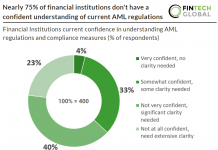In an increasingly interconnected financial landscape, financial crime has become more sophisticated, underlining the importance of maintaining robust anti-money laundering (AML) compliance for financial institutions. With stringent regulatory scrutiny and technological advancements, financial institutions must adhere to strict AML regulations to deter activities such as money laundering, terrorism financing, and other financial crimes. Moreover, understanding and considering the significant cost of non-compliance is vital.
In today’s complex regulatory environment, RegTech firm Flagright has shed light on potential pitfalls and their monetary implications. Equally crucial, it discussed ways to mitigate these risks. This information will be instrumental for financial institutions striving to maintain compliance.
Compliance is not only about ethical practices, but also about avoiding the considerable expenses stemming from non-compliance. Flagright also explored the financial impact of AML regulation violations, with a focus on hefty penalties, operational disruptions, potential legal repercussions, and reputational damage that can arise from these breaches.
Anti-money laundering (AML) regulations are a crucial part of the financial regulatory landscape, created to deter illegal activities such as money laundering and terrorism financing. These illicit activities can have serious repercussions on the economy, security, and society. These regulations serve as a valuable tool for governments, law enforcement, and financial institutions, aimed at preserving the financial system’s integrity and maintaining public trust.
To comply with AML regulations, financial institutions must meet several key requirements. They must have a thorough and robust customer identification and verification process, commonly referred to as know your customer (KYC) protocols. This ensures that financial institutions are not unknowingly facilitating illicit activities.
Ongoing transaction monitoring is another critical requirement. This includes routine monitoring to identify unusual patterns and in-depth investigations of specific transactions when needed. Record-keeping of customers’ identities and transactions is also essential, providing vital evidence during investigations and legal proceedings.
AML regulations mandate that financial institutions report certain transactions to regulatory authorities, including large cash transactions and transactions considered suspicious. Lastly, financial institutions must implement a comprehensive and ongoing AML training programme for their staff. This is crucial to ensure all employees understand the importance of AML compliance and know how to identify and report suspicious activities.
Failure to comply with these regulations can be costly. When financial institutions breach AML regulations, the financial fallout can be substantial, with regulatory bodies around the world imposing hefty fines for non-compliance. In 2020, for example, Goldman Sachs received a staggering $2.9bn fine for its involvement in the 1MDB scandal, a clear violation of AML and corruption regulations.
Furthermore, financial institutions might be compelled to return funds acquired through illicit activities, adding to their financial burden. Beyond these immediate fines, non-compliance leads to the cost of remediation, potentially resulting in further financial payouts due to class-action lawsuits from shareholders or customers. In severe cases, non-compliance could lead to the suspension of certain business activities or revocation of licenses, affecting the institution’s revenue significantly.
Moreover, there are operational and reputational implications to consider. AML breaches can lead to disruptions in business operations and damage an institution’s public image. Reputational damage can result in customers taking their business elsewhere and strained relationships with other banks and financial institutions.
AML non-compliance also carries legal implications and can lead to substantial changes in the business landscape for the institutions involved. Legal action can lead to additional financial penalties and consumes significant resources. Moreover, non-compliance can impact the institution’s business model and growth strategy. This can lead to loss of business opportunities, revocation of banking licenses, and exclusion from payment networks.
Given the severe financial, operational, reputational, legal, and business implications of AML non-compliance, financial institutions should consider implementing a centralized AML compliance platform. Platforms like Flagright offer real-time transaction monitoring, customer risk assessment, KYB (know your business) and customer ID verification capabilities, and sanctions screening, making it a comprehensive solution to meet AML obligations efficiently and effectively.
Read the story here.
Keep up with all the latest FinTech news here
Copyright © 2023 FinTech Global











